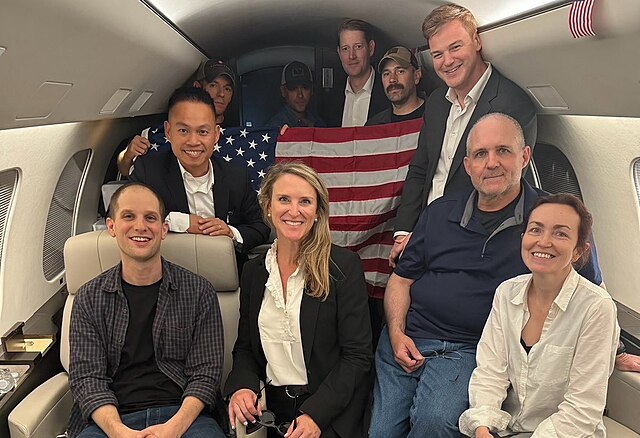U.S. journalist Evan Gershkovich, former U.S. Marine Paul Whelan, Russian-British opposition activist Vladimir Kara-Murza, and U.S.-Russian journalist Alsu Kurmasheva were released from Russian prison on Thursday in a significant and complex prisoner exchange, the largest between Russia and the West since the Cold War.
Their release was part of a swap that involved over a dozen other journalists, dissidents, and political prisoners in Russia, who were exchanged for Russians held in the West for various crimes, including murder and cybercrime.
“The deal that secured their freedom is a remarkable achievement in diplomacy. In total, we have negotiated the release of 16 individuals from Russia, including five Germans and seven Russian citizens who were political prisoners in their own country,” the White House stated.
According to The Wall Street Journal, 24 prisoners were exchanged at an airport in Ankara, Turkey. The BBC reported that the prisoners included individuals from the U.S., Germany, Poland, Slovenia, Norway, Russia, and Belarus, with Turkey acting as a mediator.
Among those released were opposition activists Ilya Yashin and Andrei Pivovarov, Memorial co-founder Oleg Orlov, former Navalny coordinators Lilia Chanysheva, Ksenia Fadeyeva, and Vadim Ostanin, artist Sasha Skochilenko, German-Russian activist Herman Moyzhes, and Kevin Lik, a 19-year-old Russian-German citizen jailed for treason.
They were exchanged for a group of Russians held in the West, including Vadim Krasikov, an FSB colonel serving a life sentence in Germany for the 2019 assassination of a former Chechen rebel commander, a killing attributed to orders from Moscow.
Russian President Vladimir Putin personally welcomed the returned Russians at Moscow’s Vnukovo Airport, escorting them down a red carpet. The exchange of Gershkovich, a Wall Street Journal correspondent and former Moscow Times reporter, followed his recent 16-year sentence for espionage, a charge he, his employer, and the U.S. government have vehemently denied.
“We are overwhelmed with relief and elated for Evan and his family, as well as for the others who were released. At the same time, we condemn in the strongest terms Vladimir Putin’s regime in Russia, which orchestrated Evan’s 491-day wrongful imprisonment based on sham accusations and a fake trial as part of an all-out assault on the free press and truth,” stated Almar Latour, CEO of Dow Jones and publisher of the Wall Street Journal, along with WSJ Editor in Chief Emma Tucker.
Moscow did not provide evidence for its accusations against Gershkovich, claiming only that the court found he “collected secret information” on a tank factory in Sverdlovsk “on instructions from the CIA.” Whelan, 54, was serving a 16-year sentence for espionage, a charge the U.S. has declared baseless. The former Marine, who also holds British, Irish, and Canadian passports, was arrested in Moscow in 2018 while working in security for a U.S. vehicle parts company.
Gershkovich and Whelan, classified by the U.S. as “wrongfully detained,” are among several Americans held in Russia, which observers describe as part of a strategy of “hostage diplomacy.”
Vladimir Kara-Murza, a 42-year-old opposition politician and journalist, was serving a 25-year prison sentence for treason and other charges related to his criticism of Russia’s invasion of Ukraine and his calls for Western sanctions against the Kremlin.
His family and supporters have expressed concern over his health, which has reportedly worsened in prison due to a nerve condition stemming from two poisoning attempts in the 2010s. He was hospitalized in July.
Bill Browder, who collaborated with Kara-Murza to advocate for the U.S. to pass the Magnitsky Act, welcomed his release, stating, “Vladimir publicly protested Putin’s war of aggression against Ukraine and the repressive dictatorship. For that, he was arrested and given the longest sentence of any political prisoner, subjected to torture, denial of medical care, solitary confinement, and other inhumane conditions to try to break his health and spirit. Throughout this ordeal, Vladimir has held his head high, his spirits strong, and has never wavered in his conviction that Russia could be a free country. His fight has set an extraordinary example for millions of Russians yearning for a peaceful and democratic regime.”
Among those released was Sasha Skochilenko, a 33-year-old artist sentenced to seven years in prison in 2023 for spreading “fake news” about the Russian Armed Forces after she replaced supermarket price tags with information about the war in Ukraine and civilian casualties in Mariupol.
“I expected nothing, and it was a complete surprise to me. At first, Sasha was taken somewhere, and we searched for her for two days. We panicked, fearing a new criminal case or something worse,” Skochilenko’s mother, Nadezhda, shared with The Moscow Times. “The exchange seemed surreal. We couldn’t even imagine it and were very worried. Tomorrow we are flying to Germany—I don’t know what awaits us there, whether we will see Sasha immediately or have to wait longer. But today—it cannot be compared to any other day in terms of happiness; I’ve never had a day like this.”
Skochilenko’s mother added, “Sasha is an ordinary citizen. In this exchange, we have remarkable individuals who are true heroes of Russia, like Orlov and Yashin. I don’t consider Sasha any less of a hero because speaking about peace and love in a country at war is incredibly commendable.”
Oleg Orlov, 71, co-founder of the Nobel Peace Prize-winning Memorial human rights group, was also among those freed after being sentenced in 2024 for speaking out against the war in Ukraine. Memorial member Alexander Cherkasov praised his release, noting, “Oleg is a person who has committed no crimes and has spoken the truth. The truthfulness of his statements was confirmed by his own trial,” adding that approximately 700 political prisoners remain in Russian prisons.
“While wonderful people who have committed no crimes are released, they are also freeing a murderer and unsuccessful spies. For Putin, such individuals are valuable. He needs to motivate others to believe they can act with impunity, and we will rescue them. However, this reflects the authorities’ responsibility in determining who they consider their own.”
While the exchange brought relief to families and friends of the freed individuals, it was a bittersweet moment for supporters of the late opposition figure Alexei Navalny. After Navalny’s death in an Arctic prison in February, his allies indicated that exchange talks involving him and Gershkovich were nearing completion at the time of his death.
A source close to the Kremlin revealed that Moscow and the West had agreed “in principle” to an exchange involving Navalny and Gershkovich, but the details had not been finalized.
On Thursday, White House National Security Adviser Jake Sullivan confirmed that Navalny was supposed to be part of the exchange.
“This is a historic exchange, and in my opinion, it should be remembered as ‘The Alexei Navalny Exchange,’” said Navalny’s longtime ally, opposition activist Lyubov Sobol. “I am very happy for all of those who are free today. But we know that Alexei was supposed to be released back in February. He was proposed to be exchanged for Putin’s murderer, Krasikov. But Putin decided to kill Navalny. Every day I think of Alexei, and it’s impossible not to think of him today.”










